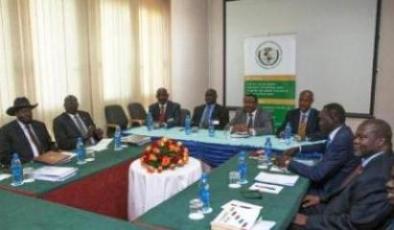South Sudan rival peace partners to negotiate solution to 28 states
January 12, 2016 (JUBA) – South Sudanese peace partners have agreed to reopen up the peace agreement for further renegotiation on whether to revoke or confirm the 28 states unilaterally created by president Salva Kiir on 2 October in violation of the peace deal he signed in August 2015 with other opposition parties on the basis of the constitutionally recognized 10 states, government’s officials said.

Minister Lueth revealed that the number of presidential advisors and the 28 states remained some of the sticking points the two parties would continue to engage in dialogue.
“It was agreed that the parties shall negotiate “outside the box” in regards to 28 states because it was not a legal issue but a political issue,” Lueth informed the public on Tuesday.
Fustus Mogae, former President of Botswana who heads JMEC also confirmed he had asked the parties: government under the leadership of President Kiir; armed opposition faction of the Sudan People’s Liberation Movement (SPLM-IO) led by Riek Machar; former detainees led by Pagan Amum and other political parties in the country to discuss the issue of 28 states and see how they can reach a consensus as a political, but not a legal issue.
“We have also agreed that the issue of the 28 states is not actually a legal issue but it is a political issue; so the parties have been directed to sit and negotiate outside the box so that the issue is resolved,” Mogae told reporters.
It was not however clear how the parties agreed to call the issue of states non-legal when the 10 states have been constitutional and therefore legal in the sense of their constitutionality. Likewise, the government unilaterally amended the constitution by inserting the 28 states into the constitution.
The issue of the 28 states will become the second sticking point to be discussed “outside the box”, meaning outside the provision of the peace agreement in further negotiations to finding a solution.
In the peace agreement, 10 states have been confirmed as the number of the administrative units in the country until the parties discuss whether or not to create more states, and on which basis, during the constitutional making process.
The move to discuss contentious issues outside the box is seen by observers to mean an attempt to reopen up the agreement for further negotiations including on deployment of joint integrated forces, among others, which the government has been split over its implementation.
The meeting also discussed the establishment of security institutions in the country and agreed that the next meeting of JMEC will be held on 2 February to follow up on the implementation of the agreement and see whether there are challenges to be addressed and resolved by the parties to the agreement.
JMEC chairman, Mogae, has called on the parties to form a transitional government of national unity in Juba and delay formation of state governments until the issue of 28 states is either confirmed, revoked or reconciled.
He on Tuesday announced that the parties to the power sharing deal will reveal names of their designate ministers to their respective ministerial portfolios which they selected last Thursday.
With the current urge to form government, it is not clear whether the leader of the SPLM-IO, Riek Machar, will return to Juba to form a transitional government with president Kiir before his forces could be deployed in the capital.
Earlier, his spokesman, James Gatdet Dak, told Sudan Tribune that Machar will not return to Juba until the security arrangements in the agreement are implemented including withdrawal of the government’s “excess” forces from Juba to 25km outside the city and deployment of joint police and military forces in the capital.
(ST)
